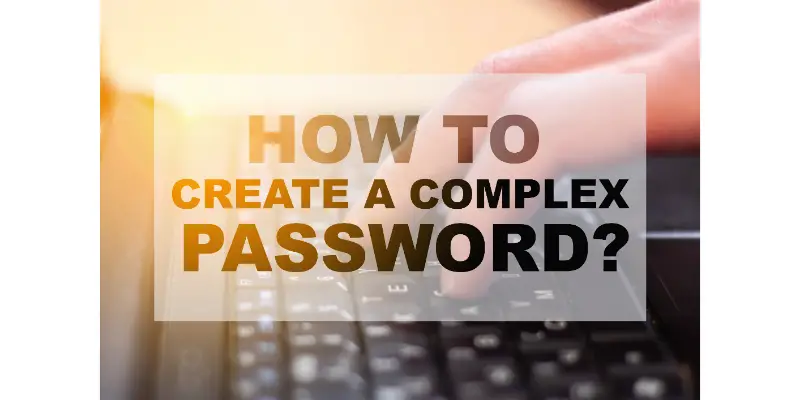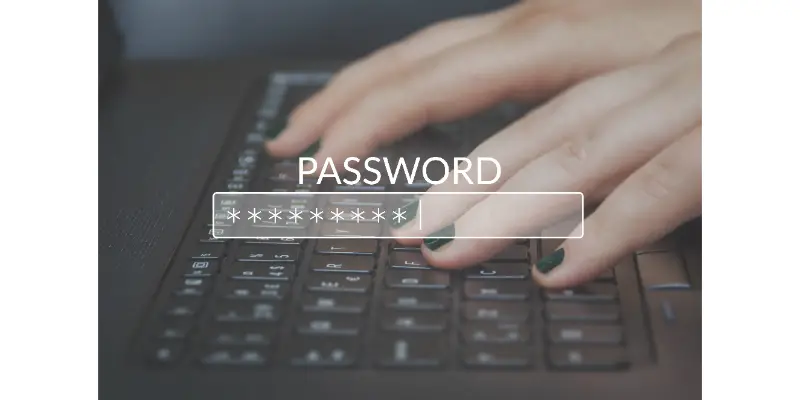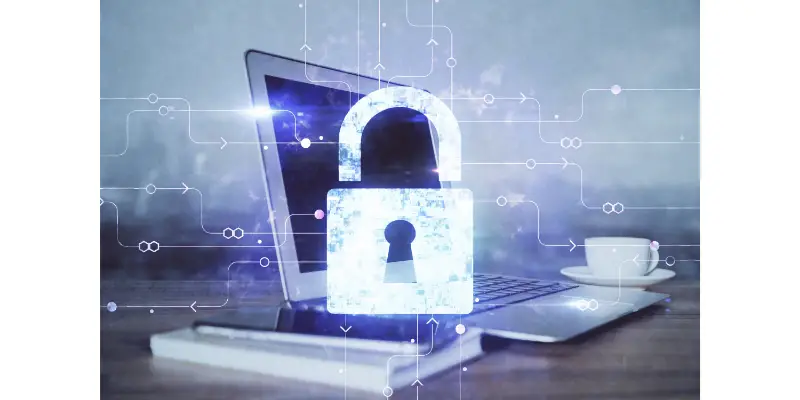Disclaimer: This post may contain affiliate links, meaning we get a small commission if you make a purchase through our links, at no cost to you. For more information, please visit our Disclaimer Page.
Much like how the keys on our padlocks work, and how our ATM cards are protected by our PIN, passwords on your Windows PC have played a vital role in securing whatever is behind that login screen of yours. To keep ourselves secure, we tend to be very creative when making a password. Some put the name of their first pet, combined names of their children, or perhaps their name but replaced with symbols. But what is the best way for your Windows password to become complex?
You should use a combination of letters, numbers, and symbols to make Windows password hard to memorize. This can also make your password secured enough to prevent hackers from retrieving your password using their brute-force software.
To be more specific in teaching you the right means to make your Windows password complex, I will provide some answers based on the most popular questions that everyday computer users think about when learning how to make a complex password. In this way, you as well will become more knowledgeable in keeping your computer, as well as all your precious files, safe and sound with a strong enough password.
Table of Contents
What Is The Recommended Password Length As Recommended By Microsoft?
As for the password length set by Microsoft, they typically advise their users to put in a minimum of 8 characters long. Take note that despite the shortness of the minimum recommended length, you can create a good password out of this already. The advantage that you can get with a short password is that you will never have a hard time memorizing it. You don’t need to save the password elsewhere on your notebook or note app.
However, what’s alarming when it comes to short passwords is that systems such as brute-force apps can easily track down passwords with short characters since brute force attacks start with the minimum amount of characters regardless of the password’s complexity. This is why several companies advise their employees to create a longer password even if the system recommends using an 8-character length as a minimum requirement.
On the other hand, Microsoft only allows a maximum of 14 characters for now, as Microsoft also wants to make sure that users won’t have to create overly complicated passwords that might result in repetitive password resets from the Service Desk. Gladly, 12 to 14 characters are already long enough for brute-force attackers to miss out on your password because of the length of time their system takes to find such a long length of character combination.
To make your password even more complex, I will tell you later what is the best type of password that you can consider if you use 12 to 14 characters. In this way, your Microsoft Windows PC, or at least your office computer, will be fully secured for your convenience.
What Are Common Passwords to Avoid?
But before I tell you what are the best tips to keep in mind to make a very complex password, you should first understand what are the common passwords that are not that recommended at all. Take note that since they are “common passwords”, these are all based on the mistakes that most users make. You might have experienced doing these as well since you arrived at this page to seek the best means to set up a strong and complex password.
To get started, just refrain from doing the following anymore:
Using Numeric Passwords
Numeric passwords are the number one most unsafe type of password combination that you might ever think about. Passwords are not developed like PINs that have a higher layer of security. Brute-force attack apps also prioritize number combinations before alphabets and alphanumeric combinations. But still, there are a lot who use combinations like ‘1111’, ‘4321’, ‘11223344’, and even their date of birth!
Consecutive Keyboard Characters
You got that right! Using keyboard characters in consecutive order such as QWERTY or ASDFGH is not advisable as it is easy to figure out. The only way where this type of password will be very secure is by adding up a symbol and number, plus making at least one character small or capitalized.
Login Details
One of the most common passwords that others use is login details. Words such as ‘welcome’, ‘username’, ‘enter’, and the infamous ‘Password’ are also very easy to figure out. But customizing it like turning two or more characters into letters or symbols is a good tip to consider for you to easily remember it. But be sure to make it long by adding a number or symbol as well.
Applying Names
Never put your name, your child’s name, your partner’s name, or even your pet’s name. These are personal information that others might know about you and can be used against you when they plan to sabotage your computer. Do not also use names of an animal and/or your favorite movie, TV, or comic book character as well!
How Complex Windows Passwords Should Be?
Now you’re familiar with the common passwords that you should avoid from now on, it’s time to become an expert in password creation. The complexity of your password is a key component in making it strong enough for both humans and machines from figuring it out. As per Microsoft’s guidelines, here are their recommendations:
- It should not contain your username or any personal information that you have.
- The password must have at least three of the following:
- An upper case letter.
- A lowercase letter.
- Digits from 0 to 9.
- Special characters such as !,@,#,$,%,^,&,*,(, and ).
- If the system allows it, you may also use the Unicode characters that can be inputted by holding the Alt key while pressing a combination of numbers on your Numpad.
- The password length should be 12 or more for full security against brute-force attackers.
It is very vital to remember the following as they have been the recommended standard for password complexity for several years already. I am also a follower of these guidelines, and have protected my login information not just on my PC, but on all my online accounts as well.
What Is An Example Of A Complex Password?
Now that you’re aware of the basic guidelines in keeping a complex password, here are the best advices that several users and I, have provided others over the years:
Use Your Name, But Customize It
You can still use your name, but in a very creative way when making a strong password. For example, if your name is Johnny, you can turn it into a mixture of letters and numbers such as 19#j0hnnY!79, which is well-secure as it also has some symbols to confuse brute-force attackers and other people figuring out what your password is. As you can see with the example, you also need to use at least one capitalized letter for added security, too.
You Can Also Put Any Personal Info
You can also use other personal information like the name of your spouse, children, first pet, hometown, and many more. Just make sure that you also turn it into a mixture of letters, numbers, and symbols. Just refrain from using personal information consisting of a combination of numbers such as your SSN, date of birth, or zip code of your address. These are information that you might have shown to other people, which in turn makes your password easier to figure out.
Make A Good Pattern Out Of It
If you are like me who is fond of using a pattern of letters, numbers, and symbols for the password, then go ahead as it is the best trick to do. Just put some random combination of allowed characters for your password, while not forgetting to still apply at least one capital letter, and you are good to go!
This is my favorite advice as I am applying this tip in almost all of my login information. When setting up a pattern of your password, you can go ahead and use characters that are near each other. Instead of using the common QWERTY, you can go ahead and use consecutive characters from the middle of your keyboards such as GHJK or IUYT. You can even use consecutive characters in either vertical or diagonal order such as YHBVGT or EFBHU.
Once done with the letters, make a combination of numbers. This time, never use numbers in consecutive or reverse-consecutive order. Use at least three numbers that are away from each other, like at least 2 or 3 numbers away such as 159 or 741. Put these numbers in the middle of the letters, or place them randomly within the password to make it harder to remember.
Lastly, you can add a symbol anywhere you want. In this way, you now have the ultimate password pattern that’s hard to forget! At first, you might need to write your new password down on paper. But as time passes by, it will become a part of your muscle memory and will eventually feel like it’s your personal information as well. The good thing about this tip is that you will also learn how to make variations out of this “pattern” that you just kept in mind.
Using A Password Generator?
You may go ahead and use a password generator to create a randomized combination of alphanumeric characters and symbols. But consider caution when using a password generator, as it must come from a trusted source.
But to make your randomly generated password even better and safer for your good, you may go ahead and customize it by capitalizing at least one letter or jumbling them instead. Just be sure to write it down in case you forget it in the future.
The Ultimate Trick In Using Short, Complex Passwords
I never advise using an 8-character password at all, which is why I would like to add up this very useful advice. Instead of using a single set of characters for your short password, you can make it long in an easy way by making two sets of short passwords. Use the following tips above to make 2 passwords, then combine them to make them even stronger. In that way, it is easy to remember, plus it is brute-force-proof!
Is A Long Or Complex Password Better?
As you can see, a long password is the best recommendation that you need to consider to keep your password strong enough. Making a complex password out of 8 to 10 characters is still easy prey for brute-force attackers, as these are the very first combinations that the apps prioritize in scanning when guessing your password.
At the same time, keeping it as confusing as possible by making it complicated is the second step that you need to remember. This does not only apply in giving brute-force attackers a very hard time; it is also hard for others to remember. If you follow the tips and tricks in the best examples of complex passwords, you will never have a hard time making one anymore.
Conclusion
Always keep in mind that passwords should be treated like your secret code, which is why complexity by making it literally complicated to remember, and unique enough for only you to recall, are factors you need to consider when making a good one.



